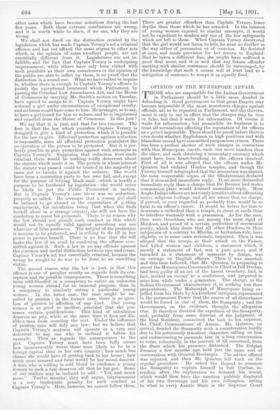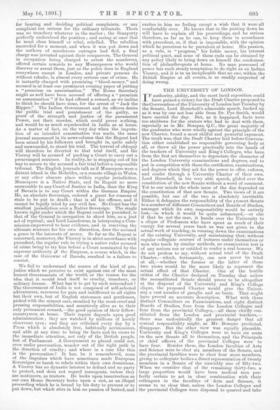OPINION ON THE MUNEEPORE AFFAIR. T HOSE who are responsible for
the Indian Government in Parliament should be a little more decided. in defending it. Good. government in that great Empire may become impossible if the most monstrous charges against officials are to be repeated in Parliament, and the Govern- ment is only to say in effect that the charges may be true or false, but that it waits for information. Of course it waits for information ; but meanwhile its business is to treat all accusations affecting the reputation of its officers as a priori impossible. There should be proof before there is even doubt whether Englishmen in high positions and with blameless record have committed purposeless crimes. There has been a perfect shower of such charges in connection with this Muneepore enteute, each one more baseless than the other, and each obtaining a momentary currency which must have been heart-breaking to the officers involved. First of all it was alleged. that the officers under Mr. Quinton had violated Hindoo temples, and though the Viceroy himself telegraphed that the accusation was absurd, the most respectable organ of the Gladetonians declared that it demanded immediate reply. It no more demanded immediate reply than a charge that Dr. Benson had stolen communion plate would demand immediate reply. Most Anglo-Indian officers are nervously sensitive about affronting native religious feelings, and all are aware that no charge, if proved, or even regarded as probably true, would be so fatal to an officer's career. It would be better for him to desecrate a cathedral than a temple, to cheat at cards than to interfere wantonly with a procession. As for the men, they were Goorkhas, who are among the most rigid of Hindoos, and proud of a, certain perfection of ceremonial purity, which they deem that all other Hindoos, in their subjection of a century to Mlecha, or barbarian rule, have slightly, or in some cases seriously, impaired. Then it was alleged that the troops, in their attack on the Palace, had killed women and children, a statement which, if merely a statement of fact, was a pure guess, and if intended as a statement of massacre by design, was an outrage on English officers. Then it was asserted, and this time believed, that Mr. Quinton, in preparing to arrest the Muneeporee Commander-in-Chief in full Durbar, had been guilty of an act of the basest treachery, had, in fact, invited an enemy to a conference, and prepared to seize him while under a guarantee. The charge, as the Indian Government characterises it, is nothing less than preposterous. The Maharajah of Muneepore being ex- pelled from his State by his brothers' intrigues, represented to the paramount Power that the source of all disturbance would be found in one of them, the Senaputty ; and the Government, on the evidence, thought the allegation true. It therefore directed. the expulsion of the Senaputty, and, probably from some distrust of the judgment of the local Resident, committed the task to his superior, the Chief Commissioner of Assam. Mr. Quinton, on arrival, treated the Senaputty with a consideration hardly due to his notoriously truculent character, calling on him and endeavouring to persuade him in a long conversation to retire voluntarily, in the interest of all concerned, from the State which his presence disturbed. The Belgian Premier a few months ago held. just the same sort of conversation with General Boulanger. The advice offered. was rejected, and then Mr. Quinton fell back on the regular procedure. He asked the Regent to summon the Senaputty to explain himself in full Durbar, in- tending after the explanation to demand his arrest, which would then have the sanction publicly displayed of his own Sovereign and his own colleagues, sitting in what in every Asiatic Slate is the Supreme Court for hearing and deciding political complaints, or any complaint too serious for the ordinary tribunals. There was no treachery whatever in the matter ; the Senaputty perfectly understood the position ; and seeing at once that he must clear himself or rebel, rebelled. The rebellion succeeded for a moment, and when it was put down and the authors of murderous outrages had fled, a final charge was invented against their conquerors. The General in occupation being charged to arrest the murderers, offered certain rewards to any Muneeporees who would discover or arrest them, just as the police does in England everywhere except in London, and private persons do without rebuke, in almost every serious case of crime. He is instantly charged with promising " blood-money," and accused in at least one prominent evening paper of putting a " premium on assassination." The Home Secretary might as well have been accused of offering a "premium on assassination " if ho had offered a reward, as we incline to think he should have done, for the arrest of "Jack the Ripper." The Indian Government and its officers desire the public trial and punishment of the guilty, as proof of the strength and justice of the paramount Power, not their murder, which could prove nothing, and would be as much reprehended in India as at home. As a matter of fact, on the very day when the imputa- tion of an intended assassination was made, the same journal announced in its news column that the Regent had been seized by his followers and brought in, quite safely and unwounded, to stand his trial. The torrent of obloquy will therefore be diverted to that trial itself, and the Viceroy will be accused of packing a Court to carry out a prearranged sentence. In reality, he is stepping out of his way to secure to the accused a fair trial before a responsible tribunal. The English journals talk as if Muneepore were a distant island in the Hebrides, or a remote village in Wales, or any other obscure place within regular jurisdiction. Muneepore is a Native State, and its Regent no more answerable to any Court of Justice in India, than the King of Bavaria is to any Court within the German Empire. He, an absolute Sovereign, ordered a guest for reasons of state to be put to death ; that is all his offence, and it cannot be legally tried by any civil law. No Court has the smallest jurisdiction over a Native Sovereign. The single known right under which the Regent could be punished, is that of the General in occupation to shoot him, as a just act of reprisal ; and Lord Lansdowne, in interposing a Com- mission empowered to hear evidence, and in reserving the ultimate sentence for his own discretion, does the accused a grace in the interests of mercy. So far as the Regent is concerned, moreover, the Viceroy is in strict accordance with precedent, the regular rule in trying a native ruler accused of crime being to try him before a Court nominated by the supreme authority V the Empress, a course which, in the case of the Gaicowar of Baroda, resulted in a failure to convict.
We fail to understand the source of the kind of pre- judice which we perceive to exist against one of the most lenient Governments of the world, or the reason for the idea that it would lend itself to cruelty, treachery, or military license. What has it to get by such misconduct ? The Government of India is not composed of self-selected adventurers, ravenous for gain and indifferent to all rights but their own, but of English statesmen and gentlemen, picked with the utmost care, steadied by the most cruel and pressing responsibilities, and sensitively alive as to their only permanent reward,—the good opinion of their fellow- countrymen at home. Their repute depends upon good administration ; they are watched by millions of keenly observant eyes ; and they are criticised every day by a Press which is absolutely free, habitually acrimonious, and able at any time to bring its facts and its views to the immediate attention, not only of the British people, but of Parliament, A Government so placed could not, even under provocation, wander out of the right path in the direction of cruelty ; and where in a case like this is the provocation ? It has, be it remembered, none of the impulses which have sometimes made European Sovereigns so harsh to rebels within their own dominions. A Viceroy has no dynastic interest to defend and no party to protect, and does not regard insurgents, unless they are mutineers, as traitors. He looks upon insurrection as our own Home Secretary looks upon a riot, as an illegal proceeding which he is bound by his duty to prevent or to put down, but which stirs in him no passion of hatred, and excites in him no feeling except a wish that it were all comfortably over. He knows that in the putting down he will have to explain all his proceedings, and he strives therefore, as far as he can, to keep them in accordance with precedent, or, if that is impossible, with the opinion which he perceives to be prevalent at home. His passion, as a rule, is " progress," his foible mercy, his interest political quiet, and none of these ends can be obtained by any policy likely to bring down on himself the condemna- tion of philanthropists at home. No man possessed of power has such steady temptation to do right as an Indian Viceroy, and it is to us inexplicable that no one, within the British Empire at all events, is so readily suspected of doing wrong.



































 Previous page
Previous page